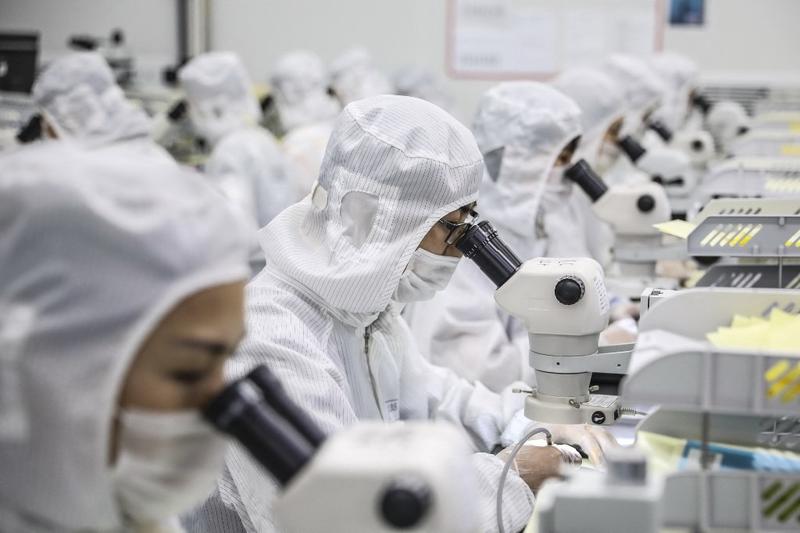 This photo taken on June 16, 2020 shows workers producing LED chips at a factory in Huaian, in China's eastern Jiangsu province. (STR / AFP)
This photo taken on June 16, 2020 shows workers producing LED chips at a factory in Huaian, in China's eastern Jiangsu province. (STR / AFP)
LONDON/TOKYO - Demand for manufactured goods drove extended growth in factories across Europe and Asia in February.
Restrictions imposed around the world to try and quell the spread of the coronavirus have shuttered vast swathes of the services industry, meaning it has fallen to manufacturers to support economies.
But vaccine rollouts and a pick-up in demand provided optimism for businesses that have grappled for months with a cash-flow crunch and falling profits.
IHS Markit’s final Manufacturing Purchasing Managers’ Index (PMI) jumped to a three-year high of 57.9 in February from January’s 54.8
IHS Markit’s final Manufacturing Purchasing Managers’ Index (PMI) jumped to a three-year high of 57.9 in February from January’s 54.8, beating the initial 57.7 “flash” estimate for one of the highest readings in the survey’s 20-year history.
ALSO READ: China remains world's top manufacturing hub for 11th year
German factory activity also reached a three-year peak last month and in France the pace of growth accelerated. Italy and Spain also saw a pick-up.
However, lockdown measures disrupted supply chains and factories struggled to obtain raw materials, leading to a big increase in delivery times.
“International shipping delays and strong global demand for raw materials have slowed manufacturers worldwide,” said Samuel Tombs at Pantheon Macroeconomics.
Factories in Britain, outside the euro zone and the European Union, reported the slowest output growth since May last month. Disruptions and rising costs linked to Brexit and COVID-19 limited their ability to respond to a modest pick-up in orders.
Asian Recovery
Manufacturing activity in Japan expanded at the fastest pace in over two years and South Korea’s exports rose for a fourth straight month, suggesting Asia’s export-reliant economies were benefiting from robust global trade.
With the global rebound still in its early days, analysts said the outlook was brightening as companies increased output to restock inventory on hopes vaccine rollouts normalize economic activity.
ALSO READ: Factory activity rises to near decade-high
“The recovery in durable-goods demand is continuing, which is creating a positive cycle for manufacturers in Asia,” said Shigeto Nagai, head of Japan economics at Oxford Economics.
“As vaccine rollouts ease uncertainties over the outlook, capital expenditure will gradually pick up. That will benefit Japan, which is strong in exports of capital goods,” he said.
The Japan PMI jumped to its highest since December 2018. In South Korea, a regional exports bellwether, shipments jumped 9.5 percent for a fourth straight month of increase.
India’s factory activity expanded for the seventh consecutive month on strong demand and increased output, though a spike in input costs could weigh on corporate profits ahead.
READ MORE: Manufacturing in spotlight as recovery from epidemic gathers speed
The Philippines, Indonesia and Vietnam also saw manufacturing activity expand in February, a sign the region was recovering from the initial hit of the pandemic.


